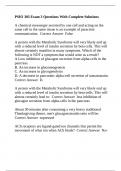Psio 303 - Study guides, Class notes & Summaries
Looking for the best study guides, study notes and summaries about Psio 303? On this page you'll find 34 study documents about Psio 303.
All 34 results
Sort by
PSIO 303 Exam 3 Questions With Complete Solutions
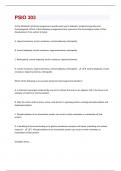
-
PSIO 303 Questions And Answers With Verified Updates
- Exam (elaborations) • 48 pages • 2024
- Available in package deal
-
- $7.99
- + learn more
As the Metabolic Syndrome progresses towards overt type 2 diabetes, symptoms typically arise chronologically. Which of the following arrangements best represents the chronological order of their development, from earliest to latest. A. Hyperinsulinemia, insulin resistance, central adiposity, retinopathy. B. Central adiposity, insulin resistance, hyperinsulinemia, retinopathy C. Retinopathy, central adiposity, insulin resistance, hyperinsulinemia D. Insulin resistance, hyperinsulinemia, cen...
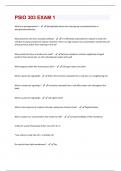
-
PSIO 303 EXAM 1 QUESTIONS WITH 100% SOLVED SOLUTIONS
- Exam (elaborations) • 22 pages • 2024
- Available in package deal
-
- $7.99
- + learn more
What are sphingomyelins? - Sphingolipids where the head group is phosphocholine or phosphoethanolamine. What prevents cells from actually swelling? - It is effectively impossible for sodium to enter the cell (due to pump and lack of sodium channels). There is a high sodium ion concentration outside the cell which prevents water from entering in the cell Why would cells have a tendency to swell? - Because cytoplasm contains negatively charged proteins that cannot exit, so cells naturally ga...
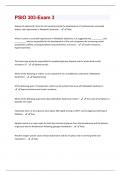
-
PSIO 303-Exam 3 Questions With Correct Solutions, Already Passed!!
- Exam (elaborations) • 33 pages • 2024
- Available in package deal
-
- $7.99
- + learn more
Release of adiponectin from fat cells would promote the development of cardiovascular associated defects and impairments in Metabolic Syndrome. - False When it comes to essential hypertension in Metabolic Syndrome, it is suggested that __________ and __________ may be responsible for the development of this core component by increasing central sympathetic outflow, causing peripheral vasoconstriction, and more. - insulin resistance; hyperinsulinemia The tissue type primarily responsible for...
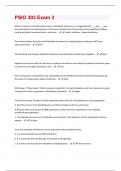
-
PSIO 303 Exam 3 Questions And Answers With Verified Updates
- Exam (elaborations) • 21 pages • 2024
- Available in package deal
-
- $7.99
- + learn more
When it comes to essential hypertension in Metabolic Syndrome, it is suggested that ___ and ___ may be responsible for the development of this core component by increasing central sympathetic outflow, causing peripheral vasoconstriction, and more. - Insulin resistance ; hyperinsulinemia The earliest defects that arise with Metabolic Syndrome are impaired glucose tolerance (IGT) and hyperinsulinemia - False All individuals who develop Metabolic Syndrome will eventually develop type 2 diabete...
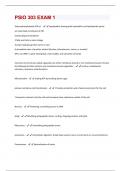
-
PSIO 303 EXAM 1 QUESTIONS WITH 100% SOLVED SOLUTIONS
- Exam (elaborations) • 16 pages • 2024
-
- $7.99
- + learn more
Glycerophospholipids (GPLs): - amphipathic (having both hydrophilic and hydrophobic parts) are main lipid constituent of PM Contain glycerol backbone: 2 fatty acid tails in ester linkage A polar head group (that varies in size) A phosphate ester of another alcohol (choline, ethanolamine, serine, or inositol) GPLs can differ in polar head group, chain length, and saturation of bonds Common cell structures called organelles are either membrane bound or non membrane bound. Choose the follow...
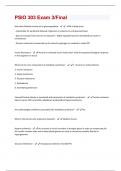
-
PSIO 303 Exam 3/Final Questions With Correct Solutions, Already Passed!!
- Exam (elaborations) • 15 pages • 2024
- Available in package deal
-
- $7.99
- + learn more
How does Skeletal muscle aid in glucoregulation - - 40% of body mass - responsible for peripheral disposal of glucose in response to oral glucose/meals - glucose transport into muscle via myocytes = highly regulated process stimulated by insulin or contractions - Glucose molecules transported can be stored as glycogen or oxidized to make ATP Insulin Resistance - Normal or elevated insulin levels don't elicit the expected biological response in the organism or tissue What are the core com...
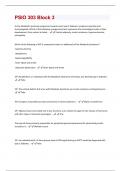
-
PSIO 303 Block 3 Questions And Answers Graded A+
- Exam (elaborations) • 11 pages • 2024
- Available in package deal
-
- $7.99
- + learn more
As the Metabolic Syndrome progresses towards overt type 2 diabetes, symptoms typically arise chronologically. Which of the following arrangements best represents the chronological order of their development, from earliest to latest. - Central adiposity, insulin resistance, hyperinsulinemia, retinopathy Which of the following is NOT a component (major or additional) of the Metabolic Syndrome? -hyperinsulinemia -dyslipidemia -hypercoagulability -heart attack and stroke -adipocyte dysfunct...
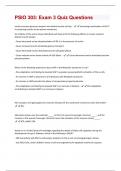
-
PSIO 303: Exam 3 Quiz Questions and Answers well Explained Latest 2024/2025 Update 100% Correct.
- Exam (elaborations) • 16 pages • 2024
- Available in package deal
-
- $7.99
- + learn more
Insulin increases glucose transport into skeletal muscle cells by: - Increasing translocation of GLUT- 4-containing vesicles to the plasma membrane An inhibitor of the serine kinase GSK-3beta will have all of the following effects on insulin-resistant skeletal muscle except: - Cause decreased serine phosphorylation of IRS-1 in the presence of insulin. - Cause increased insulin-stimulated glucose transport. - Cause decreased insulin-stimulated tyrosine phosphorylation. - Cause reduced seri...
PSIO 303 EXAM PACKAGE DEAL QUESTIONS & ANSWERS RATED A+

$6.50 for your textbook summary multiplied by 100 fellow students... Do the math: that's a lot of money! Don't be a thief of your own wallet and start uploading yours now. Discover all about earning on Stuvia

